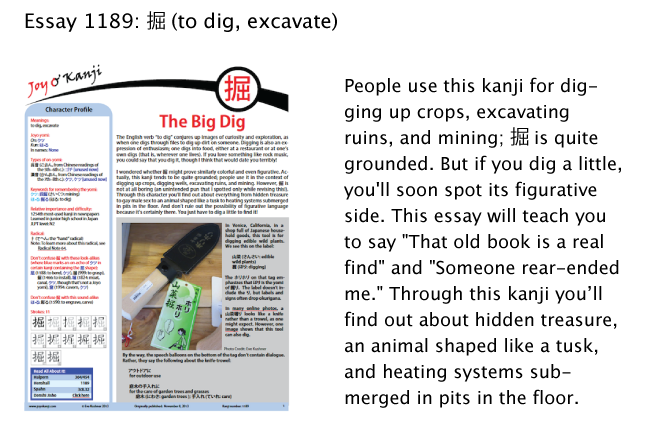Side to Side
Today's JOK Notebook may be a shock to your sensibilities. I'm not trying to startle you, of course. But just in case X-rated topics upset you, I thought a warning might be in order.
Newly published essay 1189 is on 掘 (to dig, excavate). The word 掘る (ほる) has several meanings, including this vulgar one:
掘る (ほる: (for two men) to have anal sex)
At least that's how Breen's dictionary presents it. But when my proofreader Lutlam (his Internet name) saw this definition in a draft of essay 1189, he offered a correction:
Technically 掘る applies to the "male" side (i.e., the one using his penis). For the "female" side (using his anus), the passive voice 掘られる is used.
I read this statement a few times, feeling confused. Finally I grasped his points and added this commentary to the essay:
In the active voice, the verb 掘る applies to the man who is penetrating the other. The passive form 掘られる describes the man who is being entered from behind.
I sent the revision to Lutlam, saying, "I've never heard of a man as having a male and female side in this way!!! Is this common thinking in Japan/Japanese?"
In the new version, “penetrating” and “entered from behind” made him laugh out loud, he said.
Really? This terminology is funny?!
Then he replied to my question:
Yes, we refer to the male/female sides in gay sex as 男役 (おとこやく: man’s role) and 女役 (おんなやく: woman’s role), respectively. According to Wikipedia, the male side is also referred to as タチ (立ち or 太刀? I’m not sure), and the female side is called ウケ (受け?) or ネコ (猫?).
These, of course, are slang terms.
I've certainly heard of male and female sides in electrical contexts, and I've written about inanimate "males" and "females" in terms of mountains, waterfalls, and roof tiles, but extending the idea to human bodies goes beyond anything I could have imagined. Given the macho strain that runs through so many cultures, who would have thought that the male self-image could include a female side? (Of course, that really only comes into play if one is batting for the other side.)
As long as we're talking about sides, I'll share something else I learned in writing essay 1189. Lutlam told me this:
There’s a term 裏日本 (うらにほん: wrong-side Japan) for the Sea of Japan side of the country, as opposed to 表日本 (おもてにほん: right-side Japan) for the Pacific Ocean side.
Really?!
As you likely know, 裏 can mean "rear" (no, not that again!), and 表 can mean "front." So these terms literally refer to the back and front of Japan! In and of itself, that might or might not convey a value judgment. It's true that the front of something tends to be much more important, but sometimes everything interesting lies in the hidden reaches, back behind whatever the public sees. (No, I am not still talking about gay male sex! I was actually thinking that my childhood house was much more complicated and compelling from the backyard than from the front.)
Anyway, Lutlam's comment clearly indicates that there's an urban bias to these two Japanese terms. That is, with Tokyo-Yokohama, Sendai, Osaka, Kobe, and Hiroshima (among other cosmopolitan areas) much closer to the Pacific than to the Sea of Japan, city dwellers have clearly decided that everything important and interesting happens on the Pacific side of Honshu. I would love to know how people on the "wrong" side feel about that!
Essay 1189 brought yet another discovery:
関の山 (せきのやま: largest possible thing one can do)
Knowing that 関 can mean "barrier," I asked Lutlam if this referred to a mountain barrier (though I suppose "barrier mountain" would have made more sense, given the syntax).
No, he said. According to Gogen, this 関 is a place name, and the 山 means 山車 (だし: festival float). Because the town of Seki in Mie Prefecture (on the "right" side of Honshu) was once known for making gorgeous floats, 関の山 (floats from Seki) came to mean "the best one can do." Fantastic! I can't explain why, but that explanation makes me really happy. (Dare I say that it floats my boat?)
Look how many nuggets Lutlam dug up in the course of one essay! I guess that's what happens when you focus on a kanji that means "dig"! Here's a sneak preview of essay 1189 on 掘 (to dig, excavate):

Have a great weekend!

Comments